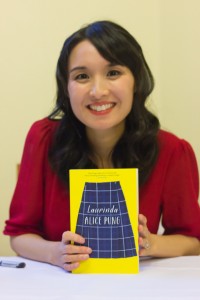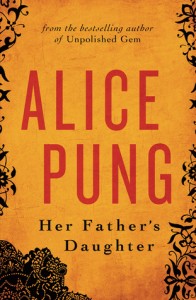A lawyer, teacher, writer and soon-to-be mother, Alice Pung thrives on juggling several things at the same time. But her passion for writing never wanes.
Alice’s first book Unpolished Gem won the Australian Book Industry Newcomer of the Year Award. Her latest book Laurinda has been longlisted for the Stella Prize and shortlisted for the Indie Book Awards.
Here she shares her journey as a writer.
Why did you decide to move from being a lawyer to a writer? Did your law background help with your writing in any way?
I still practice the law three days a week, as a legal researcher. Although my legal training doesn’t help that much with my literary writing (and in fact, might hinder it, as legal writing is quite dry and often very specialised), it has come in handy with assessing my writing contracts!
How do you do your research for your books (like Laurinda)? Do you interview people? How do you find people to talk to?
Laurinda was based on my own experiences and the experiences of friends and teachers who were generous enough to share their stories – so in many ways, it came organically. I never sat anyone down and formally interviewed them like a Royal Commission. Because Laurinda was a work of fiction, I collected stories more than sought them out (as opposed to using the latter approach for my journalism).
But when I write profile pieces or investigative pieces, I like to find people who would otherwise not have a voice or who possess an unassuming humility – children for instance, or an 82-year-old wigmaker, or Australia’s longest serving social worker.
You worked on one of your books for a decade. Why did it take you that long and did you ever lose hope at any point? How did you keep going with the project?
Her Father’s Daughter was the book that took me a decade to write. I started it when I was around 18, and finished it when I turned 30. In between, I wrote Unpolished Gem and edited Growing Up Asian in Australia. The reason it took me so long was because my father would never let me go to Cambodia to do research. He survived the genocide there and it was the one country in the world he didn’t want us to visit. The other reason was that I also had a strong feeling that I was far too inexperienced to write such a book, so I studied for half a decade instead. I did political science, focusing on Southeast Asian politics, the Holocaust and history. Her Father’s Daughter is the shortest book I’ve written (only 60,000 words) but also the one I thought most long and hard about.
What made you decide to go from writing non-fiction to fiction?
I think I just ran out of true stories from my own life! Also, I wanted to plot a book, which is something that you can’t do all that much with non-fiction. You can use artistic license and stylistic tricks, but you can’t invent or change chronology.
What inspired you to write Laurinda?
From my own experience I’ve seen how education changes lives, and also how it can catapult a person from one class to another. Australians (with the exception of writer Christos Tsiolkas) don’t talk about class – or if they do, it’s to parody it (like with Upper Middle Bogan or Bogan Pride). But class intersects with racism, sexism and all sorts of -isms we take seriously in society. So I wrote Laurinda as a glimpse into how class and power can shape individuals from a very early age.
You are quite a busy woman, how do you find time to write? What’s your writing regimen like?
I visit schools one or two days a week and work at the Fair Work Commission three days a week. So each week, I have about four to eight hours to write. I generally don’t get writer’s block because my writing time is so finite. I know if I wrote full time – that is, took the full week to write – I’d probably still only have eight productive hours of writing. So this way, I can immerse myself in the world and feel useful in other ways, and not get glum and depressed.
Finally, any advice for aspiring writers out there?
Like the Nike ads of the nineties say: just do it. I find the writers who like to get together to talk about writing are the ones who do the least writing!
Kristyn M. Levis has been working as a journalist both internationally and locally for over 13 years. Her work has been published in various publications, including The New York Times and Al Jazeera. She’s also an award winning photographer and an avid mummy blogger. Kristyn self-published two children’s picture books in the last three years and is currently working on two Young Adult trilogies. You can see more of her writing and blogging here.
Photo by Federica Roselli.


